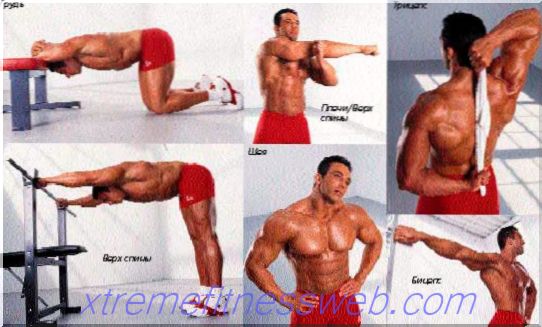- Scientific research
- Workouts for those who like to get up early in the morning
- Fat burning - from seven to nine in the morning
- Aerobic exercise - from 15.00 to 16.00
- Strength and high-intensity training - from 17.00 to 18.00
- What training is best done after 19.00 "> Summary

The right time for physical activity allows you to achieve the highest results. If it is not suitable, the effectiveness of training either decreases sharply, or is practically zero. To determine the best time for going to the gym or jogging, you need to focus on the goal - weight loss, weight gain. You should be engaged in those hours that help maintain the body in good shape, burn fat or, conversely, gain muscle mass.
Content
- 1 Research
- 2 Workouts for those who like to get up early in the morning
- 3 Fat burning - from seven to nine in the morning
- 4 Aerobic exercise - from 15.00 to 16.00
- 5 Strength and high-intensity training - from 17.00 to 18.00
- 6 What training is best done after 19.00 "> 7 Summary
Scientific research

There are many studies on what hours are best for sports. This topic is of interest to scientists around the world. Long-term studies have allowed not only to study this issue, but also to come to certain conclusions that allow trainees to achieve better results.
Studies by American scientists have shown that the timing for training should be based on the physical features of the human structure:

- Ectomorphs. People with this type of physique have a high metabolic rate. They are naturally predisposed to thinness and experience certain problems in weight gain, including muscle mass, which causes difficulties for those who want to build decent muscle. The best time for playing sports for ectomorphs is the evening when they are full of strength and energy.
- Mesomorphs. People with an average body type have no tendency to either be overweight or thin. This is due to the normal metabolic rate. Mesomorphs, according to the study, can be practiced in the morning, afternoon, evening hours. It all depends on the person’s own wishes and the availability of free time.
- Endomorphs. Owners of the third body type often suffer from excess weight. Metabolism in their body is very slow. In order not to suffer from extra pounds in the form of fat, they should do in the morning. The period from 7 to 10 hours is considered optimal and best, when the amount of glycogen with glucose is minimal and the energy for exercise is released due to the oxidation of the fat layer.
Researchers from Williamsburg conducted an experiment. It consisted in the fact that training was carried out at 8, 12, 15 and 20 hours. In each time period, several people were engaged with heavy weights. The participants in the experiment were people who had not previously played sports. This study showed that evening is the best time for strength training.
This conclusion is logical. Muscle fibers are more susceptible to contraction and faster work in the evening hours, since the temperature of the human body in the evening hours is much higher than in the morning or afternoon. In addition, the effectiveness of weight training is determined by testosterone and cortisol levels. The first is responsible for the destruction, and the second for muscle gain.
In a calm state, testosterone is high in the morning, but the most effective increase from weight training is characteristic of evening hours. And if a person wants to not only play sports, but also become the owner of an impressive muscle mass, it is recommended to perform strength exercises in the evening hours. Classes at this time bring maximum benefit and allow you to increase muscle.
People who want to lose weight and fat should exercise in the morning. This period of time is characterized by high rates of cortisol, but here there are nuances that must be studied by all those who want to become slimmer.
Workouts for those who like to get up early in the morning
For a person who wakes up early in the morning and feels alert, energetic, full of strength, morning workouts are most suitable. Of course, such classes have their own characteristics. In the morning, body temperature is reduced. This means that joints with ligaments are not very elastic, so active exercises do not bring much effect and are not recommended for execution. Gymnastics with yoga is the best choice for early workouts. They do not require a large amount of energy and allow you to feel in good shape all day.
Fat burning - from seven to nine in the morning

These two hours are best for cardio and fat burning. Cortisol from 7 to 9 in the morning is quite high, and glycogen = quite low, so during training the energy is taken from the fat layer. Morning workouts are best done within forty minutes. The intensity should be medium. A person who does not have heart problems or pressure can engage in half the time, but at a faster pace. You should focus on your own health, because not all people can do any activity in the morning.
Aerobic exercise - from 15.00 to 16.00
During this hour period, the body temperature rises and reaches its peak by about 5.30 p.m. This period is best suited for aerobics, dancing, jogging, fitness, cycling. Such activity affects not only fat burning, but also strengthens the cardiovascular and respiratory systems.
Strength and high-intensity training - from 17.00 to 18.00

From five to six in the evening it is best to exercise with weights. This time is ideal for visiting the gym, as well as high-intensity and interval training. Such exercises require maximum endurance, namely in the evening both body temperature and testosterone level rise above. A person feels a surge of strength and this has a positive effect on training.
What training is best done after 19.00 "> Summary
The timing of your workout depends on many factors. The first thing that needs to be considered for a person who decides to start attending a gym, lose weight or, conversely, gain muscle mass, is his body type. In most cases, he determines the purpose of classes. The results that a person wants to achieve also affect when it is best to do. To lose weight, exercise is best in the morning. For a set of muscle mass, evening is more suitable. However, if you have not previously been involved in sports, it is better to visit a doctor first, which will allow you to accurately establish the absence of contraindications to certain types of physical activity.







